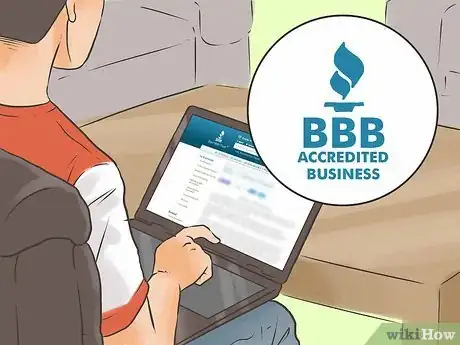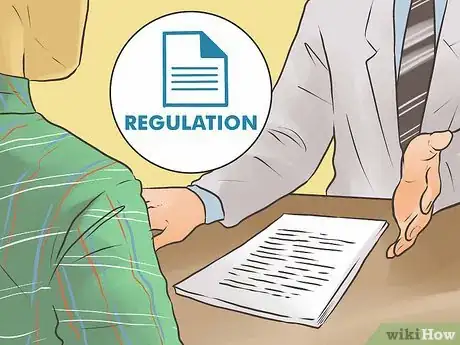This article was co-authored by wikiHow Staff. Our trained team of editors and researchers validate articles for accuracy and comprehensiveness. wikiHow's Content Management Team carefully monitors the work from our editorial staff to ensure that each article is backed by trusted research and meets our high quality standards.
There are 7 references cited in this article, which can be found at the bottom of the page.
This article has been viewed 28,710 times.
Learn more...
Restaurants are one of the most common types of franchises, and worth considering if you are interested in franchising a business. While franchises come with certain benefits, such as name recognition and some level of built-in consumer demand, buying a restaurant franchise can be complicated and does not guarantee success.
Steps
Making the Decision to Buy a Franchise
-
1Weigh the advantages of owning a franchise. There are certain benefits that come with franchise ownership that can't be had by starting a business from scratch. These perks are what makes the whole endeavor worth it for franchise owners. Examples include:
- Name recognition and demand for the product. Buying a franchise restaurant means you get to operate under a known brand name, so most customers already know whether they like what you are selling once you open for business.
- Widespread advertising and promotional deals. The company that owns the brand name does most all your marketing for you -- this is part of what you pay them for in the first place!
- Established suppliers. As a franchise owner, there is no need to find your own food supplier -- your menu and what goes into your food is already set by the parent company.
- Predetermined necessary equipment and tools. You won't need to agonize over which equipment is best for your restaurant; this, too, has already been decided for you.
-
2Examine the disadvantages of franchises. The unique set of challenges faced when owning a franchise makes this business venture simply not doable for some people. Get the facts on the risks and difficulties of franchise ownership before committing to one. Disadvantages include:
- Substantial initial investment. Typically, an enormous sum of money (sometimes exceeding $2 million for some high-profile brands) is required to enter into a franchise agreement. Because of this upfront financial burden, many of these businesses generate low profit margins for their first several years.[1] [2]
- Need for financing. The cost of entering into a restaurant franchise almost always requires financing through a third party lender. This often amounts to immense debt for the franchisee that may be difficult to recover from.
- Limited creative freedom. As a franchisee, you agree to adhere to all the parent company's rules and regulations, which usually include everything from the employee dress code to the way the food is prepared.
- Potentially difficult sales quotas. Some franchisors require that each franchise meet monthly or quarterly sales quotas as part of the franchise agreement. If these quotas end up being tough to achieve, you could risk losing the right to operate under that company brand.
Advertisement -
3Evaluate your situation. You should take a thorough look at your finances/debt, your career and life goals, and your skills and personal traits to determine whether you are well suited to restaurant franchise ownership. Consider whether you are prepared for the substantial burdens associated with starting up a franchise restaurant and consider alternative franchise businesses if appropriate.[3] Some things to think about include:
- How much money can you afford to invest (and potentially lose)? There is always the risk that you will not regain the investment you will have to put up just to purchase the franchise.
- Do you have a net worth and/or liquid assets high enough to qualify as a franchisee for the company you are interested in? Some restaurant chains require you to have a substantial net worth before they approve you to own a franchise. In many situations, you won't be able to borrow the whole cost of becoming a franchise owner.[4]
- Do you have the skills necessary to make your franchise restaurant a success? It is very rare for a restaurant franchisee to be successful without having at least some experience in the food service industry (especially as an owner or manager). To evaluate whether you have what it takes, consider shadowing for a few weeks at a business you're interested in. Some companies even require this before they will approve a franchisee's application.
- Will you be depending upon the success of your franchise for your financial survival? Many franchise owners only wish to supplement their income with a franchise. If you will depend on your franchise as your sole source of income, it is even more important that you weigh the risks involved.
- What sort of hours do you want to work? Many franchise owners must work very long hours in the first years of their business, often opening and closing their restaurant every day. If you are not willing to put in substantial time, this option may not be right for you.[5]
-
4Find the right company for you. There are widely varying requirements, costs, and potential benefits of owning a restaurant franchise depending upon the company you choose.[6] Find out what the specific requirements are for the companies you are considering by contacting the companies directly or speaking to a current franchise owner.
- Research a franchise to find out how it is doing financially, what the company's growth has been over in the past 10 to 20 years, and when the business was founded. You may have an easier time securing financing if the company you choose has a record of success in your local market.[7]
- Eat and spend some time at one of the company's franchise locations. Talk to the owner about her experience as a franchisee and ask to shadow her for a couple of weeks.
- Attend a franchise expo. These are like trade shows with many different companies in attendance and can be a great place to get information and ask questions. You may even have the opportunity to set up a meeting with representatives of one or more companies to go over specifics in finer detail at a later time.
- Contact a franchise broker: a person who specializes in matching investors and prospective franchisees with existing franchise opportunities. A broker can explain the financial details of the deal and may also help you with the applications and paperwork that go along with buying a franchise. You can search for brokers on the Franchise Brokers Association website.[8]
-
5Pay attention to location. Find out what options are open to you for establishing a franchise restaurant in an area that appeals to you. City zoning laws might prohibit opening a franchise restaurant in certain parts of your city, so find out about these by contacting your local city planner's office. The franchising company you hope to purchase from might also limit your potential territory.
- Assess the vehicle traffic in your locations of interest. Is there a major freeway or highway nearby? Are there any busy intersections in the vicinity? Does the area only become busy during rush hours? Have these questions answered by requesting traffic statistics from your local, county, or state roads department.
- Find out whether there are public transit stops nearby. Having a city bus stop just outside your restaurant could be great for business.
- Assess foot traffic in locations of interest. What other businesses are nearby? Are there sidewalks or footpaths along the street where the restaurant will stand? You can do your own investigation by observing foot traffic over a couple of hours on multiple days, or you can pay for this information from a third party source such as RS Metrics.
- Find out where your nearest neighboring franchise is located. You probably wouldn't want to open a new franchise right next door to one of the same brand that has been established for years, as you are unlikely to generate much business as the newcomer to the area. Some companies may prohibit such situations, anyway.
Making and Protecting Your Investment
-
1Examine the franchise disclosure document. Every company with franchising options has a franchise disclosure document (FDD) that provides all the legal, financial, and regulatory details relevant to the purchase and operation of one of their franchises. Look over this document very carefully for every company under which you are considering operating. You may also wish to have your attorney or financial adviser help you review its contents and explain any contractual obligations.[9]
- The U.S. Federal Trade Commission enforces a rule that requires a franchise to send you a disclosure document at least 14 days before you make a franchise investment. You can request it as soon as the franchiser receives and considers your application.
- The disclosure document includes data on the franchiser's background, license or permit requirements, initial and ongoing costs, restrictions, average incomes, gross sales and much more. These documents also may include a section on litigation history that should disclose any suits filed against the company or any of its executives, and whether the parent company has sued a franchise and why.
-
2Develop a business plan. Most financiers will require that you show them a detailed business plan when applying for a loan. You don't have to build a franchise business plan from scratch because much of the relevant market information and operational details will already be available in the FDD from your parent company. For information on what a business plan should look like, check out How to Write a Business Plan. Some things to include in your plan are:
- Strengths of the franchise brand. Use company statistics found in the FDD to make a case for the potential for success of your business.
- Your target audience. Research the restaurant brand to find out whether your business is likely to appeal to one segment of the population over others.
- Your potential market size. Analyze demographic data based on the target audience in your area to figure out how many customers you can expect over a given period and how much money you can reasonably expect to bring in.
- Start-up needs. Create a detailed list of what you will need (in terms of equipment, materials/supplies, and labor force) in order to open your doors for business. Much of this information can be easily found in the FDD. Include a justification and cost for each necessity.
- Realistic financial projections. Show your potential lender how you expect to take care of your financial obligations once you have received a loan by presenting actual net income data from your brand (and other restaurant franchises in your area, if possible). Again, the FDD will provide a good basis for this information.
- Personal achievements and qualifications. Include your resume in your business plan. You need to sell yourself as a capable and reliable person in order for the financier to back your business. The success of any business, even a franchise, depends at least in part on the strengths of its operator.
-
3Consult an accountant or financial adviser. This will likely be necessary to help you evaluate the franchiser company's financial data. Your bank or lender can help you access financing and will locate the franchiser's financial profile for you to look over.
- There are lots of financing options for franchisees, but a financial adviser can help you select the right one for you. Options include standard bank loans, U.S. Small Business Association (SBA)-backed loans, and various non-traditional loans. Some companies even specialize in rolling retirement funds into franchise loans.
- In order to qualify for an SBA-backed loan, the franchise must be SBA-approved. This is one of the most trusted means of obtaining financial backing for a franchise purchase.
- Even if you can secure a loan for your franchise, this will likely require significant collateral (such as a lien on your home) and will be in addition to a cash payment of at least 20% of the upfront cost of the franchise.[10]
-
4Look up your company's status with the Better Business Bureau. The Better Business Bureau (BBB) is an organization specializing in reporting complaints against businesses for malpractice or unethical activity. If there are lots of recent complaints against your franchisor, this could impact your business' potential for success.[11]
- Narrow your investigation to the state or city level. Local divisions of the BBB are more likely to have information relevant to you, and this is also where most consumers will turn to investigate local businesses. Find out what your potential customers will find when they search your company name.
- Find out whether your franchiser is BBB accredited. This is a special designation given to licensed businesses that meet BBB standards. If your franchise qualifies for BBB accreditation, you can apply for a license to advertise this fact and try to draw more customers to your location.
-
5Comply with franchiser regulations. Once you open your doors, you will need to ensure that you meet all guidelines and regulations stipulated in your franchise contract so you cannot be fined or sued by your franchisor or have your license revoked. It will be your responsibility to ensure that you do not violate any terms of your agreement.
- Some franchise agreements require that all equipment and/or supplies be purchased from the franchisor, which would prohibit you from being allowed to seek better deals on the equipment necessary to operate your business.
- Your contract might include a minimum for your net earnings, and failing to meet this requirement can be grounds for revoking your franchise licensing rights.
-
6Comply with food service health codes. One particularly important duty of a restaurant franchisee is to ensure that your business complies with all local, state, and federal laws regarding cleanliness and food preparation practices. Your contract with your franchisor will likely also stipulate this as a requirement for your operation under their brand name.
- In addition to potentially voiding your contract with your franchiser, violating health codes can generate extremely negative publicity that could permanently damage your business.
- Some messy regulations can be avoided altogether if you choose to invest in a franchise that only sells ready-to-serve ingredients (meaning those that do not have to be cooked on-site).[12] Consider this in determining whether the daily operations of your business will be manageable for you.
Warnings
- Franchise agreements are usually designed to benefit the franchisor company much more than the franchisee, so be on the lookout for any requirements that will significantly limit your success as a franchise owner.⧼thumbs_response⧽
References
- ↑ http://www.entrepreneur.com/article/78574
- ↑ http://finance.yahoo.com/news/what-it-takes-to-start-a-fast-food-franchise-222831956.html
- ↑ http://www.entrepreneur.com/article/78574
- ↑ http://finance.yahoo.com/news/what-it-takes-to-start-a-fast-food-franchise-222831956.html
- ↑ http://www.entrepreneur.com/article/78574
- ↑ http://finance.yahoo.com/news/what-it-takes-to-start-a-fast-food-franchise-222831956.html
- ↑ http://www.entrepreneur.com/article/78574
- ↑ http://franchiseba.com/
- ↑ http://www.franchise.com/franchise-news/Basics_UFOC_info.cfm

























































